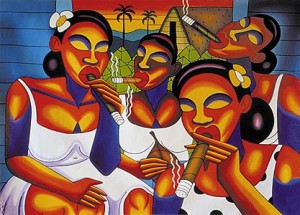Africaness in Afro-Cuban Identity Lost?
March 2, 2012 by chdent
Interestingly, in my research and thinking about Afro-Cuban women in art, W.E.B DuBois’s notion of “Twoness” continued to resurface and influence my thoughts. The notion refers to an African-American identity in which DuBois defines a struggle in consciousness between assimilating into white America and preserving African-roots. What DuBois’s discovered through this definition, was a greater movement towards whiteness where African-Americans began to completely abandon and in many cases despise their African heritage. I will not go further into DuBois’s theory, but I think that it is very usesful in understanding what happened to Afro-Cuban identity after the fall of the Soviet Bloc and Cuba’s transition into the “Special Period,” as well as what is continuing to happen in our present times.
In the Cuban context, it seems as if Afro-Cubans are being forced more and more to dissassociate with the African side of their Cuban identity for means of survival in their totalitarian society. In my recent examination of prominent female Afro-Cuban poets, writers, and filmmakers, I’ve uncovered some interesting relationships to African identity. I’ve found that some artists seem to avoid legitimizing their African heritage, while others fully recognize the burden that has come with the color of their skin and are working to give voice to those Afro-Cuban women who have been silenced. The internationally acclaimed Afro-Cuban poet Gloria Morejon said in an online statement, “ I am an indiviual, a unity, who cannot be subdivided into parts as one does when learning math..I am not more of a black person than a women. I am not more of a woman than a Cuban. I am a combustion of those factors.” Furthermore, a critic of her work described it as being, “a unifying stance, in which Spanish and African cultures fuse to make a new Cuban identity.” I have no problem with Morejon mutually acknowledging her mixed African and European lineage in which she is from, however I think that a problem arises when we unproblematize this new “Cuban identity.” If this is what Morejon chooses to endorse, then I think that in many ways she has endorsed a larger problem. How can we define this new Cuban identity? I personally would define many aspects of this new Cuban identity as being highly flawed. This was present in a 2002 census that surveyed 11.2 millon Cubans in which 1.1 million Cubans described themselves as black, while 2.8 million considered themselves “mulatto.” In my opinion this new Cuban identity has sought to completely do away with Africaness. It is an identity that has kept Afro-Cubans out of the tourist sector, and refused them access to jobs and basic forms of equality. Moreover, the new identity has reduced Afro-Cuban women to masculine beings and left them only with the hope of marrying a mulatto or a white Cuban in order to improve the social status of their children. We, need to locate the problems that lie within this new identity if we ever want it to change.
One Response to “Africaness in Afro-Cuban Identity Lost?”
Leave a Reply
You must be logged in to post a comment.

Online Examination System
» Africaness in Afro-Cuban Identity Lost? CUBAN TRANSITIONS